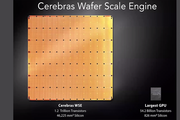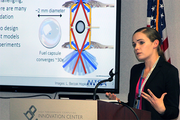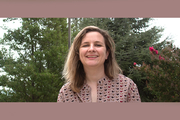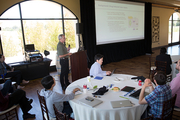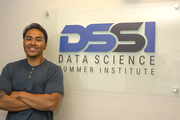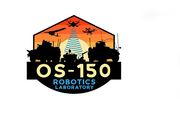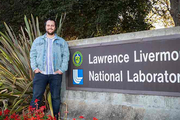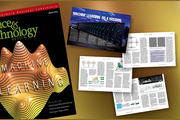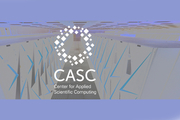Did you know we have a monthly newsletter? View past volumes and subscribe.
From intern to mentor, Nisha Mulakken builds a career in bioinformatics
Nov. 3, 2020 -
The COVID-19 pandemic has sparked a wave of new research and development at the Lab, and Nisha Mulakken is very busy. The biostatistician has enhanced the Lawrence Livermore Microbial Detection Array (LLMDA) system with detection capability for all variants of SARS-CoV-2. The technology detects a broad range of organisms—viruses, bacteria, archaea, protozoa, and fungi—and has demonstrated...
AI gets a boost via LLNL, SambaNova collaboration
Oct. 20, 2020 -
LLNL has installed a state-of-the-art artificial intelligence (AI) accelerator from SambaNova Systems, the National Nuclear Security Administration (NNSA) announced today, allowing researchers to more effectively combine AI and machine learning (ML) with complex scientific workloads. LLNL has begun integrating the new AI hardware, SambaNova Systems DataScale™, into the NNSA’s Corona...
LLNL, ANL and GSK provide early glimpse into Cerebras AI system performance
Oct. 13, 2020 -
AI chip and systems startup Cerebras was one of many AI companies showcased at the AI Hardware Summit which concluded last week. Cerebras invited collaborators from LLNL, Argonne National Laboratory, and GlaxoSmithKline to talk about their early work on Cerebras machines and future plans. Livermore Computing's CTO Bronis de Supinski said, “We have this vision for performing cognitive...
Machine learning speeds up and enhances physics calculations
Oct. 1, 2020 -
Interpreting data from NIF’s cutting-edge high energy density science experiments relies on physics calculations that are so complex they can challenge LLNL supercomputers, which stand among the best in the world. A collaboration between LLNL and French researchers found a novel way to incorporate machine learning and neural networks to significantly speed up inertial confinement fusion...
The internship that launched a machine-learning target revolution
Oct. 1, 2020 -
Kelli Humbird came to LLNL as a student intern and became a teacher of new data science techniques. In this profile, she describes her experiences and the path that led to her research inertial confinement fusion. Read more at the National Ignition Facility.
DL-based surrogate models outperform simulators and could hasten scientific discoveries
June 17, 2020 -
Surrogate models supported by neural networks can perform as well, and in some ways better, than computationally expensive simulators and could lead to new insights in complicated physics problems such as inertial confinement fusion (ICF), LLNL scientists reported. Read more at LLNL News.
Lab team studies calibrated AI and deep learning models to more reliably diagnose and treat disease
May 29, 2020 -
A team led by LLNL computer scientist Jay Thiagarajan has developed a new approach for improving the reliability of artificial intelligence and deep learning-based models used for critical applications, such as health care. Thiagarajan recently applied the method to study chest X-ray images of patients diagnosed with COVID-19, arising due to the novel SARS-Cov-2 coronavirus. Read more at LLNL...
AI identifies change in microstructure in aging materials
May 26, 2020 -
LLNL scientists have taken a step forward in the design of future materials with improved performance by analyzing its microstructure using AI. The work recently appeared online in the journal Computational Materials Science. Read more at LLNL News.
AI hardware for future HPC systems (VIDEO)
May 20, 2020 -
This interview with Brian Spears, who leads cognitive simulations at LLNL, covers the current state of evaluation of AI chips and how those will mesh with existing and future HPC systems. Watch on YouTube.
Local Women in Data Science conference showcases Lab research
April 3, 2020 -
For the third consecutive year, LLNL hosted a Women in Data Science (WiDS) regional event on March 2. The event drew dozens of attendees from LLNL, Sandia National Laboratories, local universities, and Bay Area commercial companies.
Livermore was one of over 200 regional events in 60 countries coordinated with the main WiDS conference at Stanford University. According to the WiDS website...
Deep learning may provide solution for efficient charging, driving of autonomous electric vehicles
Feb. 4, 2020 -
LLNL computer scientists and software engineers have developed a deep learning-based strategy to maximize electric vehicle (EV) ride-sharing services while reducing carbon emissions and the impact to the electrical grid, emphasizing autonomous EVs capable of offering 24-hour service. Read more at LLNL News.
Department of Energy researchers share data management strategies at first-ever “Data Day”
Nov. 11, 2019 -
It’s become something of a mantra of the digital age: Data is the new currency. Especially in science, where it’s hard to find a single project that doesn’t involve generating or consuming massive amounts of data.
In light of the growing awareness of the critical importance of data management across the Department of Energy complex, more than 100 researchers from DOE national laboratories...
Cindy Gonzales forges a new career in data science
Sept. 25, 2019 -
Through LLNL’s Data Science Immersion Program, Gonzales is now among the Lab’s newest data scientists. For two and a half years, she juggled a demanding workload—coordinating Computing’s Scholar Program, interning with data scientists, learning from mentors, supporting LLNL’s Data Science Institute, and attending college part time—while also having her first child. Read more at LLNL Computing...
Collaboration drives data science workshop
Sept. 12, 2019 -
Lawrence Livermore National Laboratory’s (LLNL’s) Data Science Institute (DSI) hosted its second annual workshop on July 23–24, 2019. Co-sponsored by the University of California (UC) system, the event drew more than 200 participants to Garré Winery in Livermore. A common theme ran throughout both days: Collaboration is always welcome.
Indeed, feedback from last year’s workshop inspired a...
Livermore Lab Foundation awards scholarship to Cal State East Bay computer science student
Aug. 2, 2019 -
Alan Noun, a computer science student at Cal State University East Bay and the recipient of the Livermore Lab Foundation's first full-year scholarship, has started a summer internship at LLNL. In partnership with Cal State University East Bay (CSUEB), the Livermore Lab Foundation (LLF) awarded Noun a one-year stipend to allow him to devote more time to academics by reducing work he needs to...
New open-air facility will be testing ground for autonomous drones, vehicles and robots
July 25, 2019 -
LLNL’s new OS-150 Robotics Laboratory is an outdoor, 8,000 square-foot enclosure that will serve as a proving ground for the autonomous drones, vehicles and robots of the future. Informally known as the "drone pen," the 50-foot-tall rectangular enclosure, located directly across from one of the Lab’s main engineering buildings, is allowing operators to pilot their drones safely and...
Protecting image classification in artificial intelligence
July 8, 2019 -
To address vulnerability concerns in image classification, a new subfield of machine learning has emerged called adversarial machine learning, which focuses on the security of machine learning algorithms. Thomas Hogan, a doctoral student of mathematics at UC Davis, spent his summer investigating this new area of research during the National Science Foundation’s Mathematical Sciences Graduate...
Speech generation: siblings collaborate on machine learning hackathon project
May 28, 2019 -
The first recording that brothers Sam and Joe Eklund, along with their colleague Travis Chambers, played for the audience was a validation.
“I endorse Travis as president of the United States of America,” the audio clip played, in a voice resembling Barack Obama’s.
The second, in the same voice, was a declaration: “Ice is back, our brand new invention” (from the song “Ice Ice Baby” by...
Machine learning on a mission
April 11, 2019 -
Machine learning uses computers to learn from data and make predictions about the environment. As the world generates more data, interpretation becomes more difficult. A smart machine—one that adapts to new information on the fly—can speed up processing and analysis times and improve its accuracy in identification and prediction tasks. Although commercial and consumer applications of ML are...
CASC research showcased at major data science venues
March 20, 2019 -
Researchers from LLNL’s Center for Applied Scientific Computing (CASC) are among the Lab’s employees making waves in the data science community, with many prominent accolades, publications, and acceptances in 2018. Data science encompasses some of the hottest technology topics—machine learning (ML), “big data” analysis, artificial intelligence, computer vision, and more—and the Center’s...



